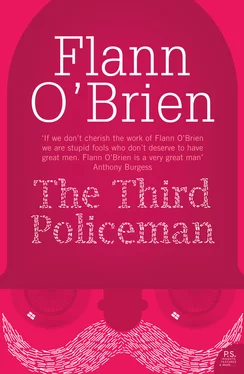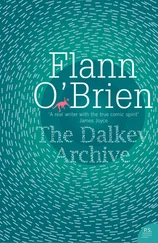I will not try to tell of the space of time which followed.
In the terrible situation I found myself, my reason could give me no assistance. I knew that old Mathers had been felled by an iron bicycle-pump, hacked to death with a heavy spade and then securely buried in a field. I knew also that the same man was now sitting in the same room with me, watching me in silence. His body was bandaged but his eyes were alive and so was his right hand and so was all of him. Perhaps the murder by the roadside was a bad dream.
There is nothing dreamy about your stiff shoulders. No, I replied, but a nightmare can be as strenuous physically as the real thing.
I decided in some crooked way that the best thing to do was to believe what my eyes were looking at rather than to place my trust in a memory. I decided to show unconcern, to talk to the old man and to test his own reality by asking about the black box which was responsible, if anything could be, for each of us being the way we were. I made up my mind to be bold because I knew that I was in great danger. I knew that I would go mad unless I got up from the floor and moved and talked and behaved in as ordinary a way as possible. I looked away from old Mathers, got carefully to my feet and sat down on a chair that was not far away from him. Then I looked back at him, my heart pausing for a time and working on again with slow heavy hammer-blows which seemed to make my whole frame shudder. He had remained perfectly still but the live right hand had gripped the pot of tea, raised it very awkwardly and slapped a filling into the empty cup. His eyes had followed me to my new position and were now regarding me again with the same unwavering languorous interest.
Suddenly I began to talk. Words spilled out of me as if they were produced by machinery. My voice, tremulous at first, grew hard and loud and filled the whole room. I do not remember what I said at the beginning. I am sure that most of it was meaningless but I was too pleased and reassured at the natural healthy noise of my tongue to be concerned about the words.
Old Mathers did not move or say anything at first but I was certain that he was listening to me. After a while he began to shake his head and then I was sure I had heard him say No. I became excited at his responses and began to speak carefully. He negatived my inquiry about his health, refused to say where the black box had gone and even denied that it was a dark morning. His voice had a peculiar jarring weight like the hoarse toll of an ancient rusty bell in an ivy-smothered tower. He had said nothing beyond the one word No. His lips hardly moved; I felt sure he had no teeth behind them.
‘Are you dead at present?’ I asked.
‘I am not.’
‘Do you know where the box is?’
‘No.’
He made another violent movement with his right arm, slapping hot water into his teapot and pouring forth a little more of the feeble brew into his cup. He then relapsed into his attitude of motionless watching. I pondered for a time.
‘Do you like weak tea?’ I asked.
‘I do not,’ he said.
‘Do you like tea at all?’ I asked, ‘strong or weak or halfway tea?’
‘No,’ he said.
‘Then why do you drink it?’
He shook his yellow face from side to side sadly and did not say anything. When he stopped shaking he opened up his mouth and poured the cupful of tea in as one would pour a bucket of milk into a churn at churning-time.
Do you notice anything?
No, I replied, nothing beyond the eeriness of this house and the man who owns it. He is by no means the best conversationalist I have met.
I found I spoke lightly enough. While speaking inwardly or outwardly or thinking of what to say I felt brave and normal enough. But every time a silence came the horror of my situation descended upon me like a heavy blanket flung upon my head, enveloping and smothering me and making me afraid of death.
But do you notice nothing about the way he answers your questions?
No.
Do you not see that every reply is in the negative? No matter what you ask him he says No.
That is true enough, I said, but I do not see where that leads me.
Use your imagination.
When I brought my whole attention back to old Mathers I thought he was asleep. He sat over his teacup in a more stooped attitude as if he were a rock or part of the wooden chair he sat on, a man completely dead and turned to stone. Over his eyes the limp lids had drooped down, almost closing them. His right hand resting on the table lay lifeless and abandoned. I composed my thoughts and addressed to him a sharp noisy interrogation.
‘Will you answer a straight question?’ I asked. He stirred somewhat, his lids opening slightly.
‘I will not,’ he replied.
I saw that this answer was in keeping with Joe’s shrewd suggestion. I sat thinking for a moment until I had thought the same thought inside out.
‘Will you refuse to answer a straight question?’ I asked
‘I will not,’ he replied.
This answer pleased me. It meant that my mind had got to grips with his, that I was now almost arguing with him and that we were behaving like two ordinary human beings. I did not understand all the terrible things which had happened to me but I now began to think that I must be mistaken about them.
‘Very well,’ I said quietly. ‘Why do you always answer No?’
He stirred perceptibly in his chair and filled the teacup up again before he spoke. He seemed to have some difficulty in finding words.
‘“No” is, generally speaking, a better answer than “Yes”,’ he said at last. He seemed to speak eagerly, his words coming out as if they had been imprisoned in his mouth for a thousand years. He seemed relieved that I had found a way to make him speak. I thought he even smiled slightly at me but this was doubtless the trickery of the bad morning light or a mischief worked by the shadows of the lamp. He swallowed a long draught of tea and sat waiting, looking at me with his queer eyes. They were now bright and active and moved about restlessly in their yellow wrinkled sockets.
‘Do you refuse to tell me why you say that?’ I asked.
‘No,’ he said. ‘When I was a young man I led an unsatisfactory life and devoted most of my time to excesses of one kind or another, my principal weakness being Number One. I was also party to the formation of an artificial manurering.’
My mind went back at once to John Divney, to the farm and the public house and on from that to the horrible afternoon we had spent on the wet lonely road. As if to interrupt my unhappy thoughts I heard Joe’s voice again, this time severe:
No need to ask him what Number One is, we do not want lurid descriptions of vice or anything at all in that line. Use your imagination. Ask him what all this has to do with Yes and No.
‘What has that got to do with Yes and No?’
‘After a time,’ said old Mathers disregarding me, ‘I mercifully perceived the error of my ways and the unhappy destination I would reach unless I mended them. I retired from the world in order to try to comprehend it and to find out why it becomes more unsavoury as the years accumulate on a man’s body. What do you think I discovered at the end of my meditations?’
I felt pleased again. He was now questioning me.
‘What?’
That No is a better word than Yes,’ he replied.
This seemed to leave us where we were, I thought.
On the contrary, very far from it. I am beginning to agree with him. There is a lot to be said for No as a General Principle. Ask him what he means.
‘What do you mean?’ I inquired.
‘When I was meditating,’ said old Mathers, ‘I took all my sins out and put them on the table, so to speak. I need not tell you it was a big table.’
Читать дальше






![О Генри - Бляха полицейского О’Руна [The Badge of Policeman O'Roon]](/books/405347/o-genri-blyaha-policejskogo-o-runa-the-badge-of-po-thumb.webp)





